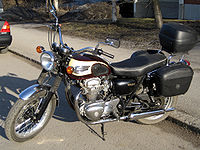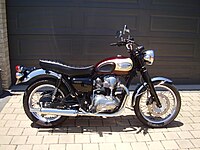The Kawasaki W650 is a retro standard motorcycle marketed by Kawasaki for model years 1999–2007. It was superseded by the Kawasaki W800.
 2000 W650 in "Galaxy Silver/Luminous Boralis Blue" | |
| Manufacturer | Kawasaki |
|---|---|
| Also called | Kawasaki W400 |
| Production | 1999–2007 |
| Successor | W800 |
| Class | Standard |
| Engine |
|
| Bore / stroke | 72 mm x 80 mm |
| Compression ratio | 8.6:1-8.7:1[2] |
| Top speed | 180 km/h (110 mph)[3] |
| Power | 50 PS (37 kW; 49 hp) @ 7,000 rpm[2] |
| Transmission | 5-speed, Chain drive |
| Rake, trail | 24° 108 mm (4.3 in)[4] |
| Wheelbase | 1,455 mm (57.3 in) |
| Dimensions | L: 2,180 mm (86 in) W: 790 mm (31 in) H: 1,075 mm (42.3 in) |
| Seat height | 790–800 mm (31.1–31.5 in) |
| Weight | 430 lb (195.0 kg)[3] (dry) 476 lb (215.9 kg)[3] (wet) |
| Fuel capacity | 15 L (3.3 imp gal; 4.0 US gal) |
The "W" in "W650" refers to Kawasaki's W1, W2 and W3 models, manufactured between 1967 and 1975.[3] The "650" refers to the engine displacement.
In 1999, superseding the Zephyr series, Kawasaki introduced the W650, resembling British motorcycles of the early 1960s, notably the Triumph Bonneville.[3] The engines of the British motorcycles used pushrods, but the W650 has an overhead camshaft, driven by bevel gears, in the same way as 1970s Ducati singles and V-twins.[5] The W650 had no connection to Triumphs. They directly descended, with modifications, from the BSA 650.[citation needed]
The W650 has a long-stroke engine of 72 mm bore x 80 mm stroke with an anti-vibration balance shaft and modern electronics. In 2006 Kawasaki added a short-stroke W400 model, in Japan. Kawasaki simply combined the same 72 mm bore with a short-throw crankshaft to give a 49 mm stroke and 399 cc (24 cu in) displacement.[6] The W400 produces 29 PS (21 kW; 29 hp) and 3.0 kg⋅m (29 N⋅m; 22 lb⋅ft).[7]
In the United States and Canada, the W650 was imported for model years 2000-2001. With weak US and Canadian sales and the introduction of the competing "retro" Bonneville by Triumph, Kawasaki concentrated sales in Europe and Japan.[3]
Production of the W400 and W650, unable to meet new emissions standards, ended in 2008.[7] In 2010, the 50 hp (37 kW) W650 was succeeded by the W800, which had a displacement increase to 773 cc (47 cu in) and fuel injection.
-
The right side reveals the Ducati-Desmo-style cover for the bevel drive system that operates the camshaft.
-
1999 W650
-
2000 W650
References
edit- ^ Franklin, Treveor (2006-11-23). "Kawasaki W650 (1999 - 2006) Review". Motorcycle News. Bauer Media Group. Archived from the original on 2022-12-01.
- ^ a b "Kawasaki W 650". Motorcyclespecs.co.za. Archived from the original on 2017-12-21.
- ^ a b c d e f "2000-2001 Kawasaki W650: Brit Done Better?". Motorcycle Classics. Vol. 8, no. 3. Ogden Publications, Inc. January–February 2013. Archived from the original on 16 December 2014.
- ^ https://www.autoevolution.com/moto/kawasaki-w650-2004.html
- ^ "Motorcycle Museum". Corporate Kawasaki. Canadian Kawasaki Motors Inc. Retrieved 2 August 2013.
- ^ Spannerman (13 December 2011). "Test: Kawasaki W400". Motorcycle Trader. Archived from the original on 5 May 2013. Retrieved 2 August 2013.
By changing the crankshaft and conrods, Kawasaki converted the 650's 72 x 83 mm bore and stroke to an engine with the same bore but a stroke of just 49 mm.
- ^ a b "カワサキ W400" [Kawasaki W400] (in Japanese). scs-tokyo.co.jp. Archived from the original on 22 January 2013. Retrieved 2 August 2013.


